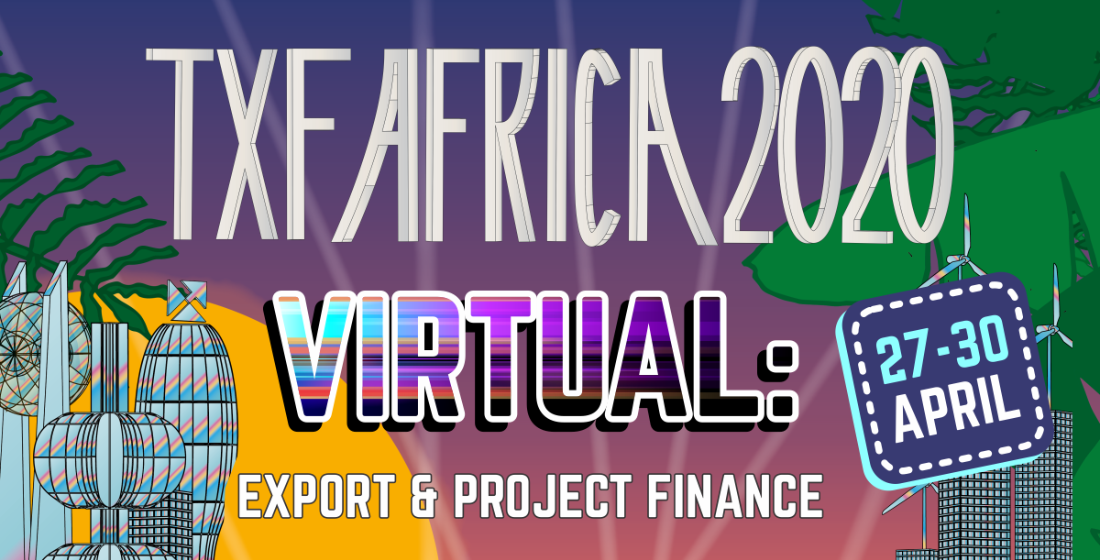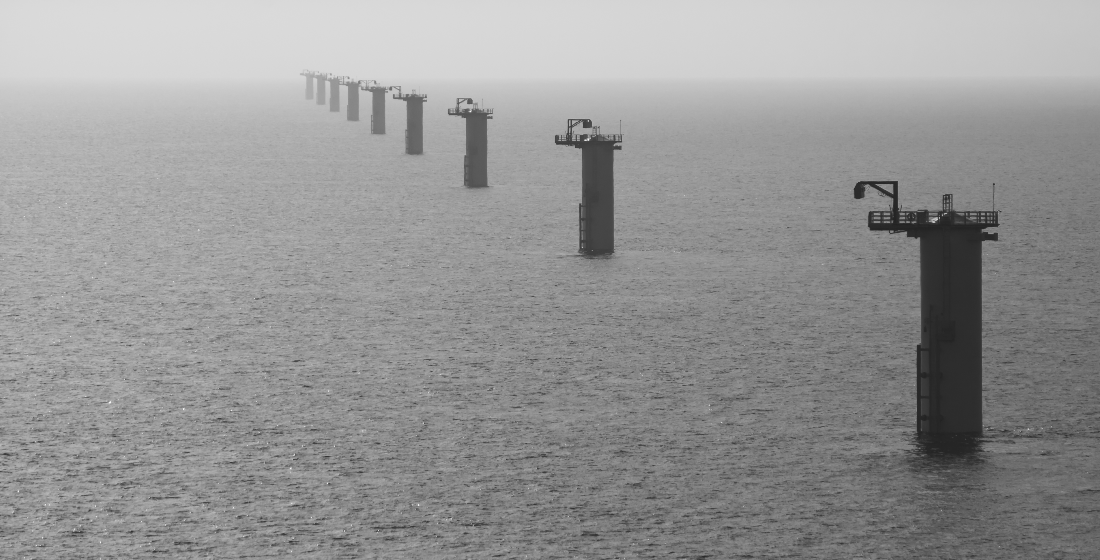Top takeaways from TXF Africa Virtual
Last week TXF welcomed 700 export and project finance practitioners to our first fully virtual event – TXF Africa 2020, as Covid-19 changes how the trade community engages beyond recognition. But TXF is determined to keep business flowing – and contribute to digitisation in trade.

In these uncertain, ‘unprecedented times’, we certainly are using the same adjectives to unprecedented levels, as Covid-19 transforms our lives beyond recognition. The precise conditions vary from place to place. From my home in North London, for example, lockdown means that my small but noisy dog has acquainted himself with the whole TXF team via video link.
It’s been a flurry of ‘firsts’ for TXF recently, and last week marked the first time a TXF international event was run from a series of bedrooms, living rooms, and dining room tables across the world. In fact, over 700 of you tuned in to TXF Africa Virtual: Export & Project Finance, the largest and most accomplished digital programme we’ve ever executed.
It is pertinent that Africa was the regional focus of our first digital event – a continent renowned for technological leapfrogging. Africa is way ahead when it comes to mobile payments and digital solutions. For instance, the cocoa industry, for which Ghana and Cote D’Ivoire are global leaders, is being revolutionised by digital solutions to improve crop monitoring, reporting, and sustainability.
Export finance is a ‘people business’, and Africa in particular is a market where deals are made on the ground. Cultivating a flourishing African export finance market in 2020 will require us as an industry to find new ways to engage with each other, and while Covid-19 keeps us apart physically, the drive for development across Africa means we can’t just wait for the storm to clear. The sheer volume of delegates attending TXF Africa is a testament to the commitment of the market in terms of embracing virtual communications, and we can’t wait to ‘see’ you all at our next online events!
Top takeaways from TXF Africa
Increased ECA (and DFI) collaboration
Covid-19 is having a cataclysmic effect on the global export finance market, and Africa is no exception. With project construction delayed and supply chains interrupted, there is greater pressure for ECAs to step up on the continent to mitigate the economic fallout. And according to panellists, ECAs need to show (and in some case have been) increased collaboration in their bid to extend short-term credit and trade receivables coverage.
ECA and DFI collaboration has long been lauded as the key to getting large-scale African infrastructure projects over the financial line. The onset of Covid-19 means this marriage of policy-driven institutions is no longer merely desirable; it is vital. Banks are now looking for cover for even small untied portions of debt amid these uncertain times – and DFIs/ECAs can work together to ensure a more holistic approach to projects. Different pools of liquidity will help optimise the funding mix for borrowers, alongside pricing and tenor, while providing comfort to commercial lenders with big ticket coverage.
There has already been examples of ECA and DFI collaboration on big ticket transactions in Africa. The $1.6 billion Standard Gauge Rail project in Tanzania, which signed earlier this year, tapped around $1 billion of ECA support – with cover from EKN and EKF, as well as five other ECAs in a reinsurance package – and DFI backing from the Development Bank of Southern Africa and the Trade and Development Bank. Other standout ECA/DFI-backed deals include the Nacala Logistics Corridor, winner of TXF’s African Deal of the Year Award in 2017 and Coral FLNG, winner of our ECA-backed Energy Deal of the Year 2017.
Meanwhile, the Mozambique LNG project and the Rovuma LNG project are both testing DFI and ECA appetite and country limits with a potential $30 billion of combined debt to be financed this year.
Will ECAs up cover to 100%?
Africa already has a high credit risk profile, and that risk is only amplified during the coronavirus crisis, especially for oil-dependent sovereigns, which means exporters need ECAs to up exposures. While ECAs remain coy over the potential for 100% cover, the private sector will continue to play a role when it comes to residual risk – this can often be to the tune of 15% for ECA-backed deals.
US Exim upped its supply chain finance guarantees to 95% from 90 % yesterday, proving there is capacity on the short-term side – but decisions will not be made quickly.
The role of the private market is masked on the continent too, as insurers often do not disclose their involvement in large-scale African infrastructure projects due to the confidentiality agreements. With ECAs yet to release any plans for 100% cover, banks will increasingly turn to the CPRI market to make up the 15% advance payment.
Intra-African trade development and plugging the infra gap
As it stands, a huge amount of capital is lost down the value chain for African exports. Ghana and Cote D’Ivoire are responsible for 65% of the world’s cocoa output between them, but these countries only benefit from a small part of this $110 billion industry. Improvements in intra-African trade links, long hailed as a necessity for Africa’s continued development, will undoubtedly help capture some of this lost value within the continent. In fact, 45% of our delegates said the greatest regional opportunities for African export finance lie within the continent itself.
The African Continental Free Trade Area (AfCFTA), ratified by 30 African Union Member States, represents a new trade block that should improve trade flows within the continent. However, notwithstanding existing barriers including a $107 billion a year infrastructure gap and the nuances of 54/55 diverse markets, Covid-19 will undoubtedly impact AfCFTA’s rollout.
TXF Data revealed infrastructure remained Africa’s biggest export finance sector by volume in 2019. Rail and road infrastructure are essential for industrial development, providing employment and connecting centres of population to industrial manufacturing areas. For AfCFTA to be at all viable, trade must have reliable connecting infrastructure across the continent.
Financing these mega-projects remains a monumental challenge, but it is not the only one. Particularly where ECAs are involved, dealmakers must consider the environmental and social issues surrounding each project, for example the displacement of people and the health and safety of onsite workers. These high-risk considerations can further contribute to difficulties in sourcing finance at the moment.
Sustainability is a necessity, but at what cost?
Africa’s population is growing quickly – by 2050, the continent will be home to around 2.4 billion people, more than half of whom will be under the age of 25. It is therefore vital to consider a roadmap to sustainable growth that will serve this growing community.
The proportion of these citizens living in cities is expected to triple by 2050, meaning that sustainable urban development must be a priority. There are various technologies, like developments in waste-to-energy projects, which can be harnessed to capitalise on an existing culture of reuse and recycling among Africa’s young population.
The renewable energy market offers exciting opportunities in Africa, but we will need a transnational approach if large-scale renewable projects are to be rolled out across the continent. Of course, sustainability is not limited to low carbon technologies – for a project to be viable for developing communities, the cost must also be practical. Africa’s energy transformation is necessary, but financing will have to be at the forefront of decision making.
The green finance market is growing exponentially, to the extent that – eventually – projects that are not sustainable will be automatically penalised as the financial market available to them shrinks.
Sustainable development in Africa requires a careful balancing act between social development and ecological concerns. On the one hand, the effects of climate change are disproportionately catastrophic for developing markets that are under prepared for extreme weather conditions – just look at the havoc wreaked by Cyclone Idai last year. On the other, it is somewhat hypocritical for developed markets to reprimand developing countries for relying on the exact types of ‘dirty’ power that was the initial fuel of western economic development. And finally, access to energy is correlated with access to education, which will be vital to upskill Africa’s growing population and drive development. After all, knowledge is power.
Now time to get up to speed on the markets.
Here's our exclusive TXF in depth articles
Live webinar: How can institutional investors support trade finance flows?
Thursday 14th May 2020 | 10:30 EST | 14:30 UTC | 15:30 BST It is more essential than ever for the trade and export finance community to engage with institutional investors to optimise their ability to access capital. Join our live 1 hour webinar as experts discuss what a long term issuer/investor relationship can look like in trade finance.
Keynote: Berne Union’s President and Secretary General, certain about uncertainty
Beatriz Reguero, President, and Vinco David, Secretary General, of Berne Union, the global export credit and investment insurance industry association, discuss the association’s strategy through the Covid-19 crisis and climate change, how uncertainty is both a plus, and a minus for its members. One thing that is certain about the coming year – is more uncertainty.
Shop talk: EASTvine – the rise of the small and flexible trade fund
TXF spoke with EASTvine Capital, a small alternative fund set up in Singapore in 2018 by three ex-bankers who saw an opportunity to fill the commodity trade finance funding gap in Asia, which currently stands at an estimated $600 billion.
Africa: Going cold turkey from Chinese infra finance addiction?
China’s president, Xi Jinping, pledged $60 billion in 2018 for African development over the next three years. But will the Covid-19 pandemic and global economic downturn light an early fuse on the time bomb of ‘addictive’ Chinese-style financings in Africa, especially for commodity-linked project debt as commodity prices tumble? Or are critics just out for China again.
Abidjan Metro: From PPP to pure EPC
The Ivory Coast decided to keep the ECA-backed financing of the Abidjan Metro on balance sheet after it initially launched the project as a PPP in 2013. TXF spoke with Alain Descamps, chairman of the STAR consortium, the project's EPC contractor, to find out whether the scheme will serve as a viable financing template for other large-scale rail networks in the West African region.
Exclusive TXF Tracker and Originals content
RFPs for Facility E IWPP delayed amid Covid-19 crisis
Prospective bidders will submit RFPs for the 2.5GW Facility E independent water and power producer (IWPP) project in Qatar by 17 August, after Qatar General Electricity & Water Corporation (Kahramaa) granted a four month extension to end the deadline of 30 April.
EDF/Jinko team wins 1.5GW Al Dhafra solar IPP
The preferred bidder for Emirates Water and Electricity Company’s (EWEC) 1.5GW Al Dhafra solar IPP has been announced as an EDF/Jinko Power consortium.
ACWA Power signs PPA for DEWA V
An ACWA/GIC team has signed a 25-year PPA with Dubai Electricity and Water Authority (DEWA) for the fifth phase of the 5GW Mohammed Bin Rashid Al-Maktoum solar park in Dubai, five months after it was awarded the scheme at a levelised cost of electricity at $0.016953 per kWh.
SWPC signs Jubail 3A IWP water purchase agreement
A consortium comprising ACWA Power, Gulf Investment and Al-Bawani has signed a 25-year water purchase agreement (WPA) with Saudi Water Partnership Company (SWPC) to back the Jubail 3A independent water project (IWP) in Saudi Arabia.





